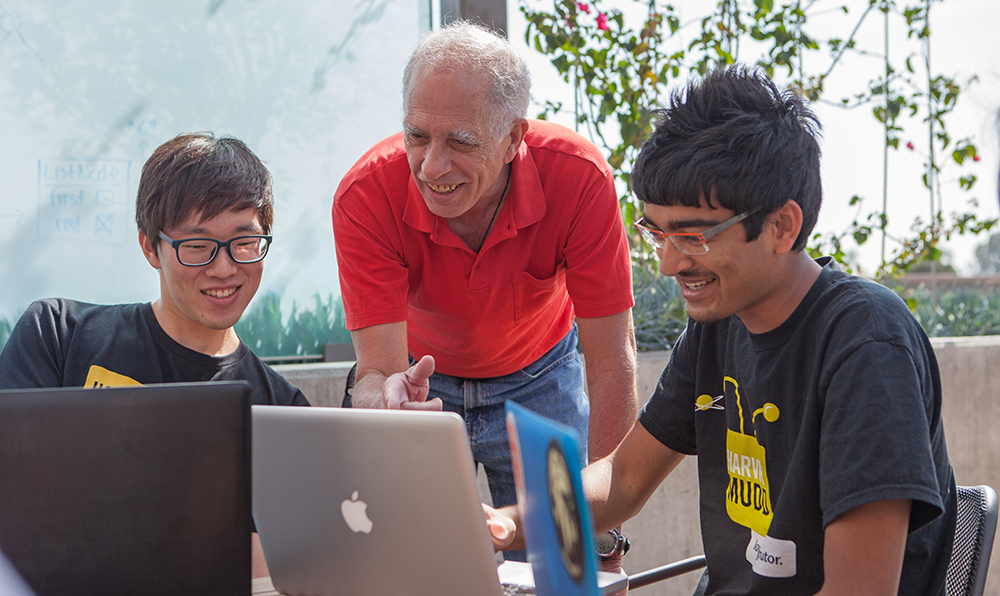CS Faculty, Students Publish Papers On Machine Learning, Deduction Games and Temporal Networks
October 7, 2019
The Harvey Mudd College Department of Computer Science reports the following recently published papers:
“The Futility of Bias-Free Learning and Search”
Along with Professor George Montañez, students Jonathan Hayase ’20, Julius Lauw ’20, Dominique Macias ’19, Akshay Trikha ’21 and Julia Vendemiatti ’21 published a paper titled “The Futility of Bias-Free Learning and Search.” Learning algorithms are machines that turn data resources into predictions. Their paper shows that unless algorithms do this conversion in a biased way, predisposing their predictions toward predetermined outcomes, they cannot predict any more accurately than random guessing. The paper proves that finding a good bias for a given problem is difficult, when searching among any set of data resources that on average isn’t itself positively biased. These results apply to machine learning algorithms, AI systems, genetic learning algorithms and many other forms of search and optimization.
“Automatically Solving Deduction Games via Symbolic Execution, Model Counting, and Entropy Maximization”
Mara Downing, Chris Thompson and Professor Lucas Bang had their paper titled “Automatically Solving Deduction Games via Symbolic Execution, Model Counting, and Entropy Maximization” accepted at the AAAI Conference on Artificial Intelligence and Interactive Digital Entertainment Strategy Game Workshop. Mara and Chris designed a DSL for expressing a class of puzzles called “deduction games,” implemented a symbolic execution engine for it using an automated theorem prover, and then wrote and entropy maximizer that outputs the steps of game solution. The main takeaway is that you can give their system the source code of a game and it will then automatically solve the game, playing it in real time.
“Graphs Are Not Enough: Using Interactive Visual Analytics in Storage Research”
Professor Geoff Kuenning (pictured above) co-authored the paper “Graphs Are Not Enough: Using Interactive Visual Analytics in Storage Research,” which appeared in the Usenix HotStorage ’19 Workshop. The paper presents a visualization tool that helps system designers and experimenters explore the vast number of possibilities available (often millions or more) when configuring storage systems. The tool makes it easy to “zero in” on the parameters that have the most impact on performance in a chosen situation, so that an analyst can quickly find the best settings for a given environment.
“Quantifying Degrees of Controllability in Temporal Networks with Uncertainty,”
The International Conference on Automated Planning and Scheduling (ICAPS) accepted three papers co-authored by Professor Jim Boerkoel with students working in his HEATLab (the Human Experience & Agent Teamwork Lab). The papers are: “Quantifying Degrees of Controllability in Temporal Networks with Uncertainty,” written with Shyan Akmal ’19, Savana Ammons ’20, and Maggie Li ’19; “Measuring and Optimizing Durability Against Scheduling Disturbances,” written with Joon Lee ’20 and Viva Ojha ’19; and “Reducing the Computational and Communication Overhead of Robust Agent Rescheduling,” written with Jordan Abrahams ’19 and co-author Jeremy Frank. The papers were presented during summer 2019 at the ICAPS conference in Berkeley, California.
Computer Science at Harvey Mudd
HMC’s computer science department seeks to provide students with a strong foundational background blending experimentation, theory and design. CS graduates are equally well-prepared for work in industry and graduate school. The capstone Clinic Program provides students with a year-long software design project and an active Research Program involves approximately 50 students in research, funded by grants and gifts from the National Science Foundation, Howard Hughes Medical Institute, and the Rose-Hills and Baker Foundations.
